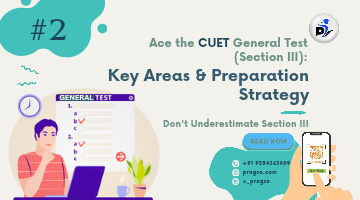Ace the CUET General Test
Key Areas & Preparation Strategy
5/8/20242 min read


While Domain-Specific subjects often grab the spotlight, the CUET General Test (GT), Section III, is a critical component for admission into many prestigious courses and universities. Its broad scope, testing general awareness and reasoning, can seem daunting. However, with a structured approach and consistent effort, the General Test is definitely conquerable. This guide breaks down the key components and offers a practical preparation strategy.
Breaking Down the General Test Components
The GT assesses a range of skills. Here's what it typically covers:
General Knowledge (GK): Focuses on static facts. Key areas include Indian History highlights, basic Geography (India & World), Indian Polity fundamentals (Constitution, government), Everyday Science concepts, basic Economics, significant Art & Culture facts, important Books & Authors, and major national/international Days.
Current Affairs: Requires awareness of recent events, primarily within the last 6-8 months before the exam. This includes national/international news, government schemes, awards, sports, major appointments, summits, and significant S&T developments.
General Mental Ability / Numerical Ability: Tests basic quantitative skills, generally up to Grade 8 level mathematics. Topics include Number System, Percentages, Profit & Loss, Interest (Simple & Compound), Ratio & Proportion, Time & Work, Speed-Distance-Time, Averages, Basic Algebra, and Geometry/Mensuration essentials.
Quantitative Reasoning: Focuses on the application of basic mathematical concepts, particularly in interpreting data presented in tables, charts (bar, pie, line), and graphs. Basic statistical concepts like mean, median, mode might also feature.
Logical and Analytical Reasoning: This assesses your logical thinking and problem-solving abilities. Expect questions on Number/Letter/Figure Series, Analogies, Classification (Odd One Out), Coding-Decoding, Blood Relations, Direction Sense, Ranking/Arrangement (Linear, Circular), Syllogisms, and Critical Reasoning (analyzing statements, assumptions, conclusions).
Effective Preparation Strategy
1. Consistency is Crucial
Don't cram the GT! Dedicate specific time slots daily or several times a week. Regular, consistent effort is far more effective than last-minute marathon sessions.
2. Stay Updated with Current Affairs
Make reading a reputable newspaper (like The Hindu or Indian Express) or following reliable news summaries/apps a daily habit. Focus on events from the past 6-8 months. Make brief notes of important happenings.
3. Build Your Static GK Foundation
Systematically go through a standard GK book (like Lucent's or Arihant's). Focus on understanding core concepts in history, geography, polity, and science rather than just memorizing isolated facts.
4. Master Basic Mathematics
Revisit NCERT Maths textbooks from Class 6 to 8. Practice calculations and problem-solving regularly to improve both speed and accuracy. Focus on the core arithmetic and elementary algebra/geometry topics.
5. Daily Reasoning Practice
Solve a variety of logical reasoning questions every day. Use dedicated practice books or online resources. This builds familiarity with question types and enhances your problem-solving speed.
6. Take Dedicated GT Mock Tests
The diverse nature of the GT makes specific mock tests invaluable. Practice answering the required number of questions (e.g., 50 out of 60) within the allotted time (usually 60 minutes). Analyze your performance to identify weak areas across all components.
Resource: Hone your skills with PragZo's General Test Mock Tests.
Recommended Resources
NCERT Textbooks (Class 6-10 for foundational Maths/Social Science)
Reputable Newspapers / News Apps (The Hindu, Indian Express, etc.)
Standard GK Compendiums (Lucent, Arihant, Manorama Year Book)
Quantitative Aptitude Practice Books (e.g., R.S. Aggarwal)
Logical Reasoning Practice Books/Websites
PragZo Platform: Check for curated GT notes, quizzes, and mocks
Conclusion: Don't Underestimate Section III
The General Test requires broad awareness and consistent practice across diverse areas. It's not about deep expertise in any one field but rather a solid foundation in several. By incorporating daily current affairs reading, regular GK review, and consistent practice of quantitative and reasoning skills into your routine, you can confidently tackle this section and significantly boost your overall CUET performance. Start today!
